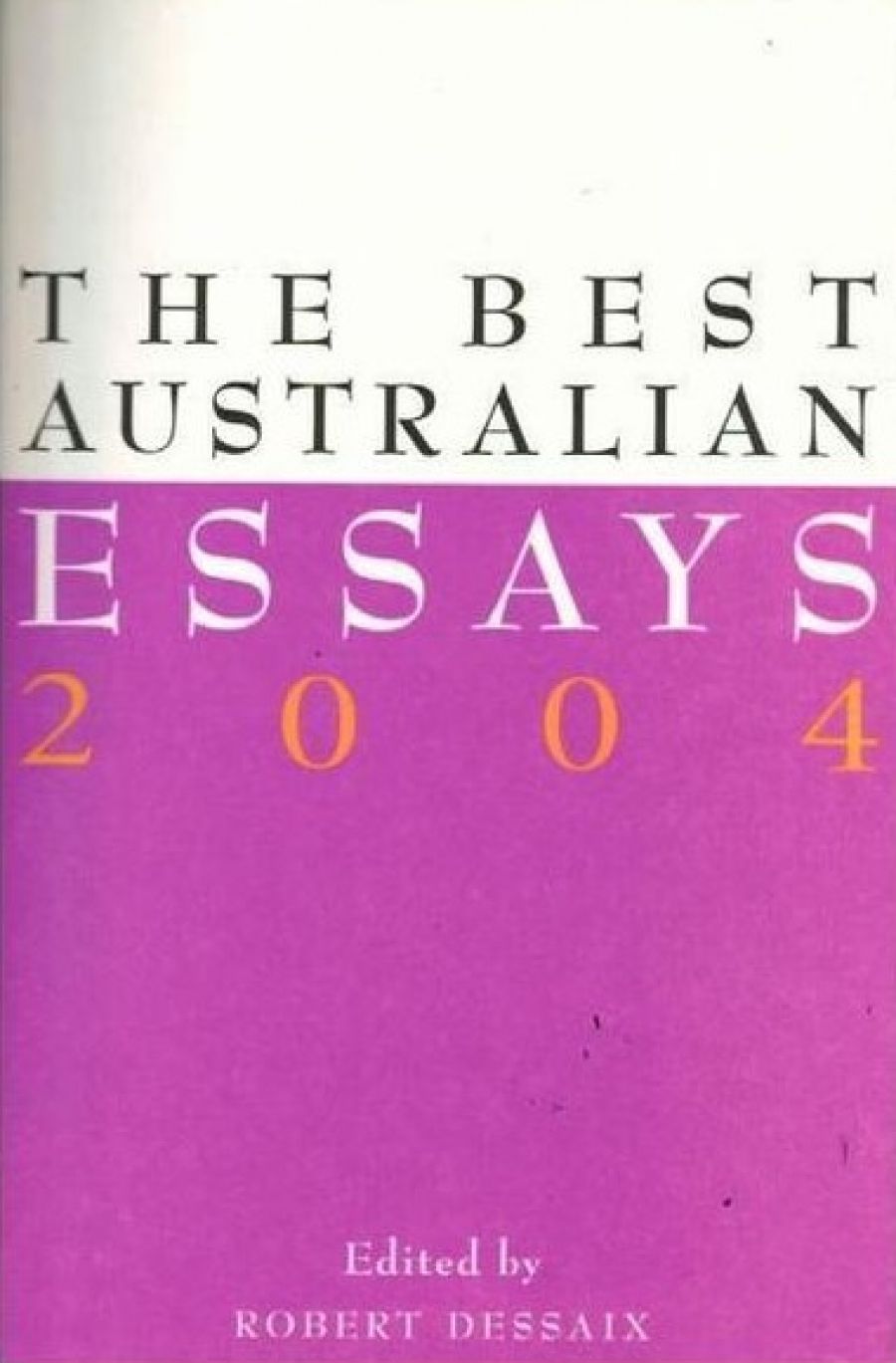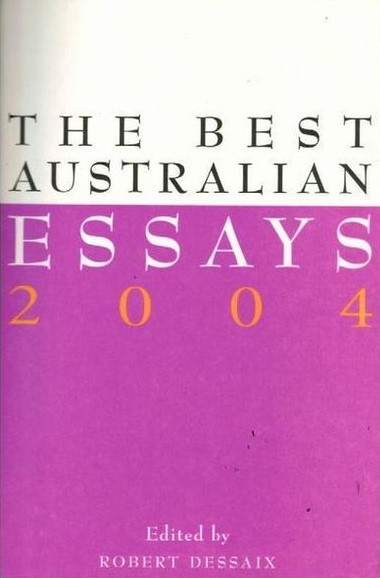
- Free Article: No
- Contents Category: Essay Collection
- Review Article: Yes
- Article Title: Gentle Voices
- Online Only: No
- Custom Highlight Text:
Since the publication of the inaugural Best Australian Essays in 1998, Black Inc.’s ‘Best’ series has grown into an impressive franchise that now takes in the Best Australian Stories, Best Australian Poems and Best Australian Sportswriting. That, until this year, the essays, stories and regular Quarterly Essay should all have had a single editor, Peter Craven, seems in retrospect quite extraordinary. It was perhaps inevitable that such an empire would eventually fragment – evolving, say, into a rotating series of guest editorships under Craven’s direction. But his departure from Black Inc. early this year, after a disagreement with publisher Morry Schwartz over the future of the Quarterly Essay series, came as a shock to followers of this series.
- Book 1 Title: The Best Australian Essays 2004
- Book 1 Biblio: Black Inc., $24.95pb, 319pp
- Book 1 Cover Small (400 x 600):

- Book 1 Cover (800 x 1200):

Robert Dessaix is an interesting choice as the new editor of Best Australian Essays. A self-confessed lover of the playful and ambiguous, with an avowed dislike of pieties and academic labels, he is the temperamental opposite of Craven, whose impulse is to classify and judge. Dessaix sets the tone for his new editorship in a crisp editorial that does not critique past issues directly, but instead reflects upon our current era of ‘panic and seriously inflamed passions’. This atmosphere of feverish debate, he argues, has all but drowned out ‘the gentle voice of the traditional essay’ in Australia. In the face of more fiery rhetorical forms, Dessaix expresses a preference for ‘pieces where the voice [is] clearly personal, easily located at a particular time in a particular place’. While he does not go into his choices essay by essay, the brevity of this introduction, and the reduction of page numbers from last year’s 500 to 300, are in themselves a kind of mission statement.
And there is more here, reading between the lines. Dessaix is positioning his anthology quite clearly on the side of a renewed Australian essay-writing tradition that goes back to 1994, when Cassandra Pybus established the Island essay competition. Her aim was to reinvigorate in Australia the art of the ‘personal essay’ – a form with foundations in the wonderfully plastic ruminations of the sixteenth-century writer Montaigne. The subsequent anthology of winning entries urged us to think of essay writing as a fusion of ‘passion, complexity and craft’. While one could argue that academic essays and newspaper articles have become less impersonal over the last few decades, thus blurring the line that separates them from the personal essay, fans of the personal essay would argue that it is still a distinct literary form whose voice is more refined, its opinions less set. Ideally, it is about letting the mind play lucidly and freely – a technology of thought in which the writer’s very self is tested and discovered (hence Montaigne’s term ‘essai’) in the act of applying itself to different subjects.
Consequently, you will not find in Dessaix’s collection newspaper columnists and political heavy-hitters such as Best Essays 2003’s Paul McGeough, Paul Kelly or Robert Manne (indeed, only five of the essays are sourced from the press); or generic cuckoos-in-the-nest such as Mark Davis’s Dateline interview with Gore Vidal in that same issue. Instead. the majority of essays are written by literary authors. They are, on the whole, more allusive, layered and focused on personal experience. This produces a range of pieces with a capacity to surprise but which can also seem, at times, almost perversely ephemeral.
The collection opens impressively with Torn Keneally’s ‘The Handbag Studio’ (originally published in Granto), an arresting account of the author’s ‘fraternal ambush’, while shopping for a briefcase in Los Angeles, by store-owner and Holocaust survivor Leopold Page. Keneally characterises himself winningly as a genial duffer who, by the end of the meeting, has been handed the story of Schindler’s List. Delightfully spacious and structured like a story, the essay allows us to share Keneally’s growing intrigue as the story of Page and the enigmatic Schindler unfolds.
Two other essays stand out in this collection: Nicholas Jose’s ‘The Compliment Men’ and Andrea Goldsmith’s ‘Chain Reaction’. An ex-diplomat as well as a novelist, Jose uses the path of his morning walk through Washington’s embassy quarter, taken when he was an adjunct fellow at Georgetown University, to read the mood of a city about to go to war against Iraq. Atmospheric, intelligent and muscular with detail, this essay ranges from considering the city’s statuary and architecture, to Frank Moorhouse’s Dark Palace and the decline of the United Nations, to an incisive, elegant indictment of Australia’s place in America’s theatre of war. Goldsmith’s piece is also a kind of travel writing, taking us through the world of reading. Recounting her fascination with books about physicists as she faces a wrenching personal crisis, Goldsmith leads us into a wider, and very moving, exploration of love, uncertainty and the fear of loss.
Other essays are solid and engaging. Richard Flanagan’s ‘The Rape of Tasmania’ is an essential indictment of the corporate interests behind his state’s old growth logging industry, while Simon Caterson’s ‘Building the Total University’ will resonate with anyone who has worked at an Australian university during the past decade, and will explain the threadbare state of tertiary education to anyone who has not. Then there is ‘On Becoming a Mormon for a While and Other Madnesses’, first-time novelist Maria Hyland’s shrewd and lucidly honest story of escaping her toxic family, originally written for the London Review of Books – its only fault being that it cuts out just as it appears ready to gain amplitude.
This feeling of coming to an abrupt end is shared across a number of contributions, and is symptomatic perhaps of the fact that well-paid spaces for essays longer than 3000 words are dwindling in Australia. It is interesting to note that Dessaix sources some of his best essays, such as Tim Flannery’s on the fate of large predatory mammals, from international magazines such as The New York Review of Books and Granta. In the Australian context, Meanjin puts in a strong showing along with that new kid on the block The Griffith Review.
Dessaix divides his material into three sections. ‘Memories’ includes Isabel Huggan applying North American nature-writing thoughts about style to Tasmania, and actor Billie Brown’s memories of accompanying an ageing London starlet to the theatre. ‘Arts and Artists’ finds J.M. Coetzee’s Nobel Prize acceptance speech, another of his intriguingly gnomic essay-parables and Kerryn Goldsworthy on singing in a choir. Linda Jaivin and Peter Mares on detention centres and John Birmingham on the rich join Jose Flanagan and Caterson, among others, in ‘The Wider World’.
Dessaix’s strategy of cordoning off the most topical essays into this last section has an unfortunate side-effect. The collection’s last third feels disconcertingly weighty, while taken en masse, the more fanciful essays – Carmel Bird on photographing cats and dogs in Spain, Peter Conrad on Tintin, or Azhar Abidi’s Borgesian ‘essay’ on the history of flying carpets – can feel overly whimsical and effete. A richer, more energetic effect might have come from allowing the essays a different mix.
While Best Essays 2004 could do with some more challenging essays from writers with a foot in the academies (such as Meaghan Morris, Gail Jones, Brenda Walker, Adrian Martin or Ross Gibson), and some younger authors, it does show that the personal essay is healthy enough to fill a yearly collection, even if it has to be tracked down from around the world, in its last verdant hiding places, like one of Flannery’s predatory mammals. While a sense of urgency and drive is somewhat absent from this collection, it is compensated for by the poise and elegance of a number of these pieces.
For my money, this collection is worth the cover price alone for Donald Home’s charming, almost Nabokovian ‘Mind, Body and Age’, in which the author, now in his eighties, reflects upon the history of his own body from a complicated birth, through the injuries of adolescence, to the longer hospital stretches of older age. Restless, humorous and endlessly interested, this is the voice of an agile mind reflecting upon the curious fragilities of the body, moving us gently to question its relationship with culture and one’s very sense of self. Once, waking from a general anaesthetic, Home finds himself hallucinating:
A continuous stream of little ants, hundreds of them, runs, like a mobile dado, around the top of the walls. When I am talking to people we suddenly shift location: I am in a New York flat designed by Mondrian; I am in a nineteenth-century Russian mansion with a tented roof, painted scarlet, decorated with black maple-leaf shapes; I am in a Norwegian fishing village; I am in a West African cultural centre where, to the tune of ‘The Teddy Bears’ Picnic’, they are singing. ‘It’s ethnic time for teddy bears.’ I was to go on talking about this for months. It was like reporting on a sightseeing holiday that, although perhaps not significantly revelatory, had, with a startling clarity, refreshed me in the art of attentive looking.
What better than this last sentence to describe the essay at its best? A questing, mobile intelligence, moving lucidly through its own light and shade, to refresh the art of attentive looking. Perhaps Dessaix is right, and essays – along with stories, novels and poems – really do keep us civilised, by insisting on refreshing the world’s possibilities in an age of black and white.


Comments powered by CComment